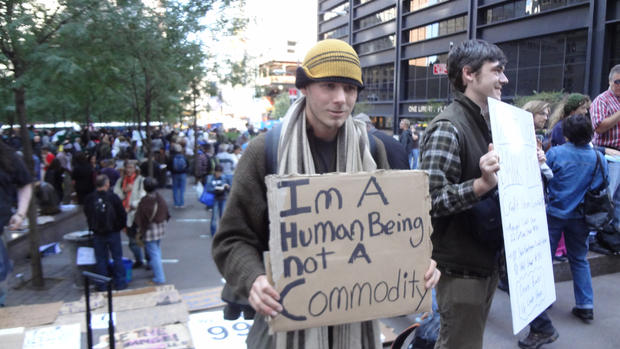"Occupy" and anti-war protests converge in D.C.
WASHINGTON, D.C. -- Friday marks the 10th anniversary of the U.S. invasion of Afghanistan, and opponents of the war have been planning a demonstration in Washington for months. Meanwhile, just a few weeks ahead of the planned protest, an anti-Wall Street movement sprung up in New York and caught fire across the country.
So the anti-war protesters latched on to the "Occupy Wall Street" protests, which came to Washington's Freedom Plaza on Thursday without a specific grievance or demand -- just the general desire to bring attention to an uneven economic and political playing field that favors large corporations.
To opponents of the wars in Afghanistan and Iraq, the connection between the anti-war rally and the "Occupy" rally was clear.
"Of course they're connected," said Judith Simmons of Olney, Maryland. "Our infrastructure's following apart," she said, as a fifth of the federal budget goes to the Defense Department.
President Obama today acknowledged the "broad-based frustration" that the "Occupy" protests represent, but Simmons was unimpressed by his comments.
"That's nice," she said. "I'll wait until I see some action. Bring all the troops home."
While the "Occupy Wall Street" crowd is largely made up of young people, Simmons and her friend Clare Sinclair represented an older generation of passionate anti-war protesters. Simmons, 88, and Sinclair, 91, have been protesting the Afghanistan war every weekend for the past 10 years.
"And we're getting rather tired of it," Simmons said.
Occupy Wall Street: The scene on the ground
Obama: "Occupy Wall Street" reflects "broad-based frustration"
Anti-Wall St. protest spawns others across U.S.
Samantha Goldman, a member of the steering committee for the anti-war group World Can't Wait, said the "Occupy Wall Street" movement is a chance to get more young people involved in the anti-war movement.
"The amount of people in my generation camping out is very inspiring," said Goldman, 24. "Most people my age can't remember a time without the wars, so that affects the resistance."
Camped among the young people hula-hooping, strumming guitars, debating politics or gathering petition signatures, Goldman and other anti-war protesters vied for the attention of the hundreds gathered. They set up drone models, a "torture museum" and a "sign garden" where people could design their own protest sign.
"A lot of people, broadly speaking, aren't seeing the connection" between economic injustices and the wars, Goldman said. But she's optimistic.
"There is a lot of potential to link those more. It's still in its embriotic stage," she said. Now, she added, the question is "whether it goes to 'I care about my debit card charges,' or 'I care about the other 99 percent of the world, who are toiling in factories or on the other end of a drone strike.'"

